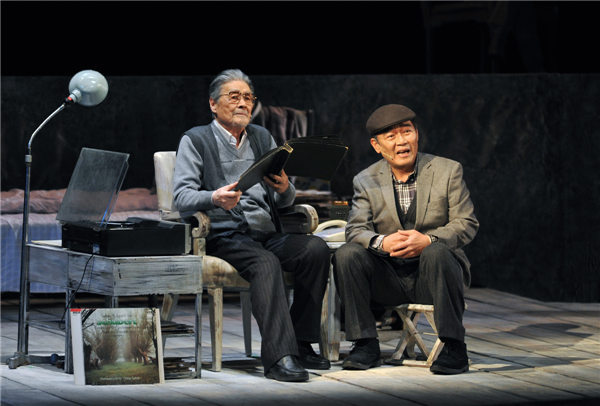

 |
|
Chen (right) makes several visits to Jin, his old friend, in an attempt to win forgiveness for what he did in politically charged 1966. Photos provided to China Daily |
A new play kneads well-known Chinese tragedies into a compelling drama, Raymond Zhou reports.
Awintry landscape unfolds in Stan Lai's latest play, both visually and psychologically, yet the agony of memory finally yields to the hope of reconciliation as a pair of aging Chinese intellectuals find peace with each other and, more importantly, with themselves.
Winter Journey is essentially a two-hander. Lan Tianye, a veteran from Beijing People's Art Theater, and Lichun Lee, a long-time collaborator of Lai's from Taiwan, portray two writers whose friendship harks back to the 1940s. Political upheaval in 1966 turned the cordial relationship topsy-turvy-with Chen, Lee's character who is a poet and translator of T.S. Eliot, betraying Jin, Lan's character, who is an ardent lover of Franz Schubert.
The tug of war is between Chen's begging for forgiveness and Jin's refusal to grant it. Playwright Wan Fang obviously drew her material from her father and his coterie of friends. Her father, Cao Yu, was China's pre-eminent playwright, who failed to deliver any substantial work after the atmosphere of political correctness squeezed in. While Cao was a survivor, another great writer Lao She died by drowning himself after a day of humiliating denunciation and beating and, presumably, his family's refusal to take him in at the end of that day.
Traces of that episode permeate the tale, which takes place in the 1990s when Jin was recovering from cancer and Chen was preparing for a memoir. The inclusion of these painful details in the subsequent best-seller is a testament of his effort to come clean with his past and a subtle reminder of the difficulty of turning over that page of Chinese history-considering that only a few high-profile figures have come forward and asked for forgiveness from those upon whom they inflicted unspeakable cruelty in the heyday of madness.